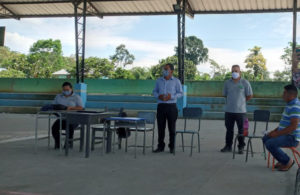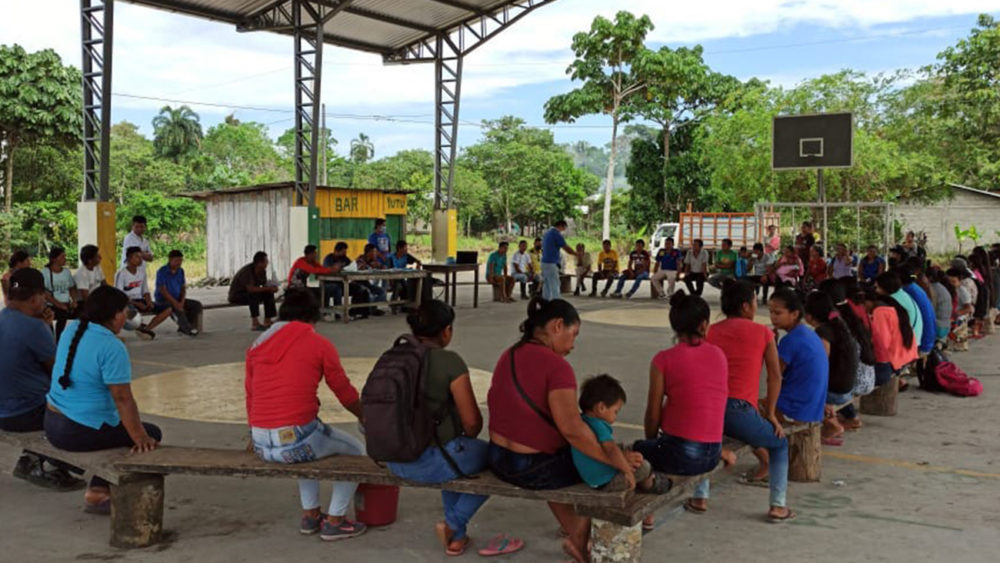The transformation, modernization and development processes in Latin America have been a constant challenge for all the actors involved, especially when we speak of individual and collective rights. International cooperation agencies, civil society, States and government institutions, and local communities and indigenous nationalities are all part of this complex network of actors seeking to improve people’s quality of life without generating negative impacts on local livelihood systems.
In this scenario, all these actors face the challenge of ensuring that development proposals are adequate and do not violate individual and collective rights. These rights are the mainstay for development to become a force that is consistent with the aspirations of local communities, which is why self-determination, respect for free, prior and informed consultation and development with their own vision are considered pillars, not only for human development, but also for sustainable processes over time with a high social impact.
In the case of the PROAmazonía program, the main objective of the intervention is to prevent deforestation in the Ecuadorian Amazon and preserve 160,000 hectares of forest along the way, avoid more than 13 million tons of CO2 and promote the transition of 15,000 hectares towards sustainable productive practices throughout the region. These and many more important milestones promote joint work throughout the Amazonian landscape between the central State, Decentralized Autonomous Governments and local communities.
Achieving these goals implies a very important political, budgetary and technical commitment, and as such requires mechanisms that articulate various actors, promote the achievement of common objectives and, above all, strengthen local governance and respect for human rights, fundamental pillars for achieving the conservation of natural resources and strong local governance, which is one of the main pillars of REDD+ in the country.
Along the same lines, and focusing a little more on the spectrum of intervention of the PROAmazonía program, during 2018 and 2021 several restoration initiatives have been promoted throughout the provinces of Pastaza, Napo and Sucumbíos. These initiatives, associated with the National Forest Restoration Plan, are implemented in indigenous territories under a mixed management model that operates through local partners, with the participation and involvement of indigenous organizations and technical assistance from the PROAmazonía program and the National Forest Restoration Program of the MAAE.
It is vitally important for a management model of these characteristics to ensure that the operation of restoration initiatives has the consent, support, involvement and vision of local communities to achieve better results. One of these experiences is found in the Cascales canton, located in the province of Sucumbíos in the north of the Ecuadorian Amazon.
The Decentralized Autonomous Government of the Municipality of Cascales (GADMC) promotes the restoration of its territory within the framework of its competencies; through the project called: Recovery of ecosystem services of 1,000 hectares of native forest and promotion of biocommerce as an alternative for the sustainable use of the natural heritage by the nationalities of the Cascales canton.
This project, which seeks the active restoration of 400 hectares of forest and passive regeneration of 600 hectares, was built in a participatory manner during the months of July and August 2019, in socialization meetings held in the Shayari community, the Cofán Bermeo ecological reserve and the offices of the municipality of Cascales. [1]
After a period of adaptation, to the context of COVID -19 during the first part of 2020, the GADMC resumed contact with the communities identified during the last quarter of 2019. This socialization process was carried out by the technical team of the GAD between the months of September and October 2020: Jesús del Gran Poder, Centro Chunch (September 26, 2020), the Pastaza Community and the San Francisco Community Center in the Shirys commune (October 3, 2020) and the San José de Aguarico Commune (October 4, 2020).
The socialization of the restoration initiative, carried out during the months of September and October 2020, motivated the interest of the communities that have formally expressed their desire to continue with the restoration project; through communiqués addressed to the mayor of the canton, Silvio Quevedo.
With this first interest mapping work by the GADMC and PROAmazonía, an inter-institutional cooperation agreement was signed on October 27, 2020 between the Ministry of Environment and Water of Ecuador and the GADMC to implement the Forest Restoration Project of 1,000 ha; and on the other hand, a letter of intent was signed between the five communities involved.
In March 2021, the GADMC formalized the signing of consent agreements with the five communities to initiate activities in the territories of the Kichwa communities. This, in order to strengthen their restoration capacities and support the proper management of the territory under restoration schemes in important areas for the conservation of ecosystem services.
This ratification of the formal commitments to restore an important area of the Cascales municipality is the confirmation of a sustained process of participatory construction and consultation that the GADMC and the beneficiary communities have promoted as an opportunity to strengthen local governance and restore the native forest in the Nueva Troncal parish. The initiative also seeks to promote the conservation and protection of wetlands and generate productive bio-entrepreneurships of the communities as a response to the exploitation of the forest.


Photographs: Courtesy of Nixon Ríos- Director of Environmental Management of the Cascales GAD
Description: Free, Prior and informed Consultation Process
[1] It is worth emphasizing that during much of 2020 the consultation processes become complicated due to the pandemic caused by COVID19, which keeps the implementation of the project at bay and with some considerations related to the health of the communities and from the technical team of both PROAMAZONIA and GADMC.
Author: Rodrigo Torres, Technical Specialist in Environmental and Social Safeguards.
 Español
Español English
English

Comments are closed.